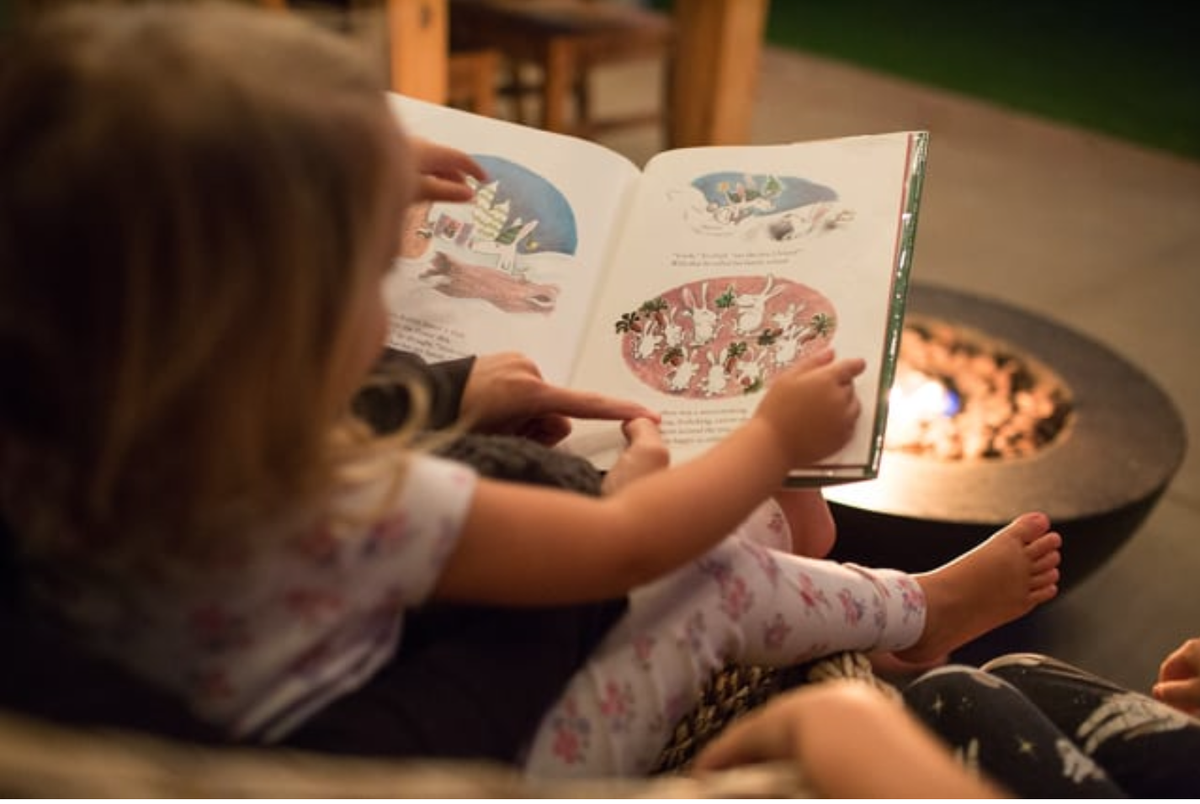Want to Raise Smart, Kind Kids? Science Says Do This Every Day:
happyyouhappyfamily.com/raising-smart-kids

Want to Raise Smart, Kind Kids? Science Says Do This Every Day:
happyyouhappyfamily.com/raising-smart-kids
When it comes to raising smart kids who are kind, you need this powerful but simple habit. It’s completely free, it takes just 10 or 15 minutes a day, and anyone can do it.


As parents, we have big dreams for our kids.
We want them to be smart so they can go after what they want in life and have a reasonable chance of getting it. We want them to grow up to be kind, caring members of the community. And it would be nice if they also turned out to be the type of people who remember to signal before turns.
That’s a tall order. Especially when I consider the day a success if I remember to brush all my kids’ teeth twice a day.
And yet, now is the time to set our kids up for success in life. Short of morphing into a drill sergeant who fills every spare moment with flashcards and forced kindness, how can we raise smart and kind kids?
Here’s the Good News About Raising Smart Kids
As it turns out, we have one magic “keystone habit” as parents that will help us raise smart, kind kids.
If you haven’t heard of keystone habits before, they’re an elite category of habits that kick off a chain reaction, influencing several areas of your life at once. In other words, you can focus on just one keystone habit, and you’ll experience several positive impacts.


The best thing about this particular “keystone habit” for raising smart, kind kids is that it’s completely free, it takes just 10-15 minutes a day, and anyone can do it.
To get smart, kind kids, you don’t have to sign your kid up for expensive tutoring or have twice-daily screenings of the movie Wonder.
All you have to do is this: Read to your child. Even if they already know how to read to themselves.
Because research shows reading aloud is the powerful keystone habit that will raise smart, kind kids.
But This Is What Gets in Our Way
As parents, the demands on our time are endless.
We have laundry to do, sibling battles to mediate, and healthy dinners to prepare. Our kids need help with homework, the car is due for an oil change, and it’s our turn to bring snacks after the football game.
On and on and on.
This is why when it comes to reading aloud to our kids, we tend to prioritise it lower. In a 2018 survey of American families, only 30 percent of parents reported reading aloud to their kids for at least 15 minutes a day.
This is what happens when you read aloud to your child every day:
Your child will hear a wider variety of words. Here’s why this is important: “The one pre-kindergarten skill that matters above all others, because it is the prime predictor of school success or failure, is the child’s vocabulary upon entering school. Yes, the child goes to school to learn new words, but the words he already knows determine how much of what the teacher says will be understood. And since most instruction for the first four years of school is oral, the child who has the largest vocabulary will understand the most, while the child with the smallest vocabulary will grasp the least.” – The Read-Aloud Handbook


You grow your child’s brain, literally. The more you read to your child, the more the neurons in her brain will grow and connect together.You put her on the path to be a lifelong reader. Reading is essential for the learning process, and kids who struggle with reading tend to struggle in school. But you have the power to give your child this one key to success in school and life because: “The single most important activity for building the knowledge required for eventual success in reading is reading aloud to children.”– Becoming a Nation of Readers


Your child’s behavior will improve. When you read aloud, you increase your child’s ability to pay attention and concentrate – skills that definitely help your child in school. Also, reading aloud to a child can even decrease aggressive tendencies in the child.You build a stronger bond with your child. Kids love when you read aloud to them because of the physical closeness and emotional bonding it offers: “We’re blown away that kids time and again said the most special time they recall spending with a parent is reading together.” This makes sense when you think about it. In our busy modern lives, how often do we stop everything we’re doing, put down our phones, and just enjoy time with our kids? A strong connection with your child leads to better cooperation from them, and that’s something pretty much every parent could use more of.


You increase your child’s capacity for empathy. When you read fiction to your child, her brain is “literally living vicariously through the characters at a neurobiological level.” In other words, you’re exposing your child to different types of people and giving her the ability to put herself in their shoes while you read. Growing your child’s empathy muscle will teach her to be a friend who empathises, a partner who can see her partner’s side in a disagreement, and a compassionate person who helps others in need.
The moral of my little research project? The one single habit of reading aloud to your child kicks off a chain reaction of all these positive outcomes, and more. If you’re looking for the secret to raising smart kids, reading aloud is it.
So why aren't we making it happen?
Knowing that reading aloud to your kids is important and actually making it happen every day are two separate things.
Sometimes, all we need is a tweak or two to make reading aloud a daily habit and set our kids up for a fulfilling, happy life.
Some common reasons that get in the way of making it happen:
1. I’m busy.
How to Fix It: Make reading aloud a daily habit. Duh, right? But here are a few hacks for making it happen:
Bundle it. Think of another daily habit you never skip, and bundle reading aloud with that. For example, you wouldn’t skip brushing your kid’s teeth at night, so make a rule that you won’t brush teeth until after you’ve read aloud. Or as another example, you could read aloud to the kids while they take a bath or if they’re slow eaters, while they finish eating dinner.
Give yourself a visual cue. Visual cues are great for reminding yourself in the moments you’re most likely to forget. For example, after reading aloud at bedtime, you could put the book back on your child’s nightstand as a reminder to read the next night. Or you might get a sturdy wire basket, fill it with a few of the best picture books, and leave the basket on your kitchen counter or in a visible spot of your living room.
Track it. Post a piece of paper on your fridge or use colourful dry- erase markers to write on your bathroom mirror, and keep track of your goal. You might draw a green checkmark for every day you’ve read aloud and a red X for any day you miss. Your goal is to keep a string of checkmarks going as long as possible!
2. My child can read on their own.
When our kids are old enough to read on their own, we tend to stop reading aloud. But the problem with stopping at this point is that we’re not helping our beginning readers get to the next reading level.
“Reading and listening skills begin to converge at about eighth grade. Until then, kids usually listen on a higher level than they read on. Therefore, children can hear and understand stories that are more complicated and more interesting than what they could read on their own. Beyond the emotional bond that is established between parent and child (or teacher and class), you’re feeding those higher vocabulary words through the ear; eventually they’ll reach the brain and register in the child-reader’s eyes.”
– The Read-Aloud Handbook
In other words, a fourth grader can listen to and appreciate a seventh grade level story before she can read it herself, and that’s how you’ll build her vocabulary enough so she can read a higher level book one day.
How to Fix It:
Always remember that older kids still like to be read to, even though they may not admit it!
But if you’ve taken a break from reading aloud to your older child and they’re used to reading on their own, it may seem odd to start back up again with reading aloud. Here are a few ideas for easing back in:
Ask them to tell you about what they’re reading. Then say, “Ooh, that sounds really good! Do you mind if I read out loud a little bit to you so we can both enjoy it at the same time?”Invite them to help you pick out a family read-aloud book, then you can all take turns reading out loud at dinner every night.
If you subscribe to the newspaper or magazines and you come across an interesting article, say to your child, “Can I read this to you? I read it and thought you would enjoy it.”Listen to audiobooks during your commute to/from school or while you do chores together, like folding laundry or unloading the dishwasher.
Find something funny like a poem or a short story and ask to read it out loud to them. Kids love funny, no matter how old they are!If your child was assigned a book to read for school, ask if you can read it out loud to them.
3. I don’t enjoy reading aloud.
This can happen for two reasons: you don’t like the book, or you just don’t like the experience of reading out loud.
Reading aloud isn’t about your ability to perform. It’s about connecting with your child. Because of the physical closeness and emotional bonding involved, reading aloud is something that kids regularly call out as their favourite activity to do with their parents .
How to Fix It:
The first one’s an easy fix because the world has thousands and thousands of children’s books to choose from, so just pick another one you’ll all enjoy and read that instead.
If you struggle with the experience of reading aloud, try to reframe that time in your mind to focus on the connection you and your child will get from it. For example, you might come up with a special name for that time, like “Cuddle and Read Time” or “Cozy Book Hour” or “Hugs and Books Extravaganza.”
If that doesn’t help, try reading aloud a different genre than normal. If picture books aren’t your thing, maybe poetry would be fun. If poetry doesn’t cut it, try nonfiction. If nonfiction is a no-go, try reading aloud plays and doing different voices for different characters. Just keep trying until you find something you can enjoy.
4. My child won’t sit still.
If every time you try to read aloud, your child loses interest and runs off to do something else, you’re going to get a complex real fast and think your child isn’t interested.
Especially with active kids, listening is an acquired skill. But with a daily read-aloud habit, kids will learn how to listen. Remember that when you read aloud, you increase your child’s ability to pay attention and concentrate – skills that will help your child in school and in life beyond school.
How to Fix It:
Ease your kids into read-aloud time with books that are designed just for active kids. Check out 12 Best Interactive Books for Kids That Will Get the Wiggles Out. Read at bedtime when kids are starting to calm down for sleep and are already tucked into bed.
Read aloud when you have a captive audience, like when your child is eating a meal or is in the bathtub.Take your child to the park, plop them in the swing, then read while you push them.
Also, make sure your child is enjoying the books you’re reading. If they’re really into dinosaurs and you’re reading about dump trucks, that could be the root of the issue.
5. My kids are all different ages.
How to Fix It:
Many 10-year-olds still enjoy listening to a good picture book, and even teenagers still love hearing them read picture books out loud.
But if your older child really isn’t interested, try reading interesting magazine or newspaper articles out loud to her while she’s eating or doing chores. You might say, “Hey, check this out! I thought you might like this...” And then just start reading.
As another idea, you can read out loud to your older kids when the younger ones are in bed at night or while they’re taking a nap.
6. My kid interrupts...on every page.
Nobody likes to be interrupted – especially not when you’re trying to do something for your child and she interrupts you.
But as it turns out, kids asking questions during a book are an essential part of the learning process:
“Those of us who have seen a movie more than once fully realise how many subtleties escaped us the first time. This is even more the case with children and books. Because they’re learning a complex language at the adult’s speaking pace, there often are misunderstandings.”
– The Read-Aloud Handbook
How to Fix It:
If your child’s question is about the story itself, go ahead and answer it right away because odds are, your child isn’t fully understanding what’s happening and that’s why she asked.
If the question is tangential to the story or completely unrelated, try saying something like, “Ooh good question! At the end of the story, we’ll talk about that.”